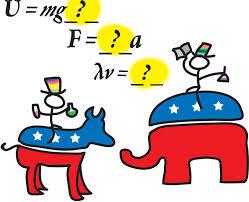
A Pew research study shows wide gaps between what American scientists and the American public think about a range of issues, including many with weighty policy implications. The AP story about the study says that "[t]he gaps didn't correlate to any liberal-conservative split," but, reading the details, I think that's a confection tossed out to keep the heart rates of our right-handed friends in an acceptable zone.
On the proposition that humans and other living organisms have evolved, 98% of scientists, but only 65% of all adults, agree. Regarding climate change, the gap is similar--only half of American adults, compared to 87% of scientists, think it's mostly a consequence of human activity. (The science respondents were members, from all disciplines, of the American Association for the Advancement of Science; the 87% figure rises to 98% if one counts only the views of climatologists.) On other questions, the gap is even wider--for example, nearly nine in ten scientists (88%), but barely a third of adults (37%), think it's safe to eat genetically modified foods. On the currently contentious questions of fracking and off-shore drilling, the gaps are narrower, but scientists are still significantly more inclined than is the general public to take the "liberal" view. Half the public, but only a third of scientists, favor more off-shore drilling. Both the public and scientists are unpersuaded of the supposed benefits of fracking, but the roughly 60-40 public split rises to about 70-30 among scientists.
Unless I've missed all the bug-eyed liberals ranting in the halls of Congress about the dangers of genetically modified foods, I'd say that the scientists look a lot like what Republicans call "elitists"--a silly pejorative that seems to suggest we should ignore what experts think so as to adopt the views of Billy Bob from Baton Rouge.
